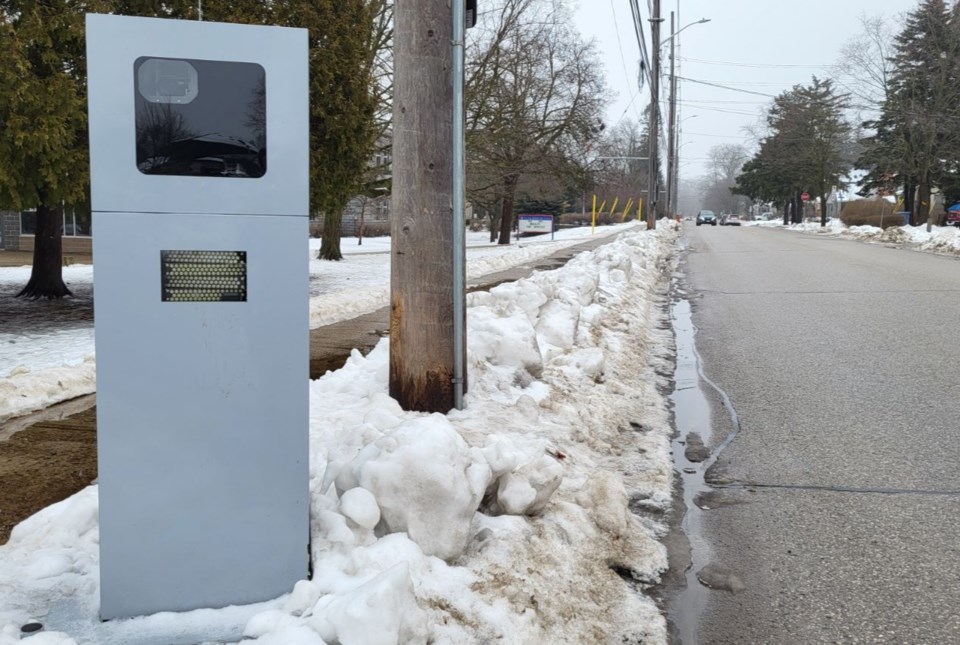City council will be asked Monday to endorse a speed-management scheme that will slap local drivers with so many new speeding tickets the local Provincial Offences Act office (POA) won't be able to handle them all.
The plan is to nab speedsters in community safety zones and school zones, using four automated speed enforcement cameras from Redflex Traffic Systems (Canada) Ltd.
Right now the POA office at the Ronald A. Irwin Civic Centre processes about 10,000 Highway Traffic Act violations a year.
In a report prepared for Monday's city council meeting, city staff predict the four new automated speed traps will catch an additional 20,000 offences.
"Adding this number of tickets to the city's provincial offences system would not be manageable with current staffing levels and justices of the peace," says the report, written by Jeffrey King from the city's legal department and Dan Perri, municipal services and design engineer.
"In order to prevent court backlogs and to manage prosecution workloads, staff are recommending the implementation of a secondary tribunal system.... to adjudicate infractions outside of the traditional POA court system," King and Perri say.
Based on an estimated $60 a ticket, the plan would generate $1.2 million a year in revenue.
But the new tribunal office would require office space, equipment and fixtures, as well as three new employees with total payroll of $267,000.
A part-time hearing officer would also be needed to review and make a final decision when tickets are challenged.
Annual costs of operating the cameras and new office are estimated at $945,000, with an additional $110,000 in first-year startup expenses.
After running automated cameras for five years, the city would be ahead $1.08 million that King and Perri say could be used to fix the roads.
"If a vehicle exceeds the posted speed limit in an... enforced area, the system captures an image that is stored and reviewed by a provincial offences officer.
"A ticket is then issued to the registered plate holder of the offending vehicle. As the ticket is issued to the registered plate holder of a vehicle and not the driver, demerit points are not applied to these infractions," King and Perri say.
Automated cameras are reported to reduce traffic speeds, they add.
"A recent study conducted by the Hospital for Sick Children Research Institute found that the percentage of drivers exceeding the speed limit by more than 20 km/h was reduced by 87 per cent on road segments where ASE was present."
Here's what city council will be asked to approve on Monday night:
- pursue an agreement with the City of Toronto Joint Processing Centre (JPC) for automated camera offence processing. The JPC employs provincial offence officers to issue charges captured by the new cameras, along with additional support staff for investigation, contract management, and record management. The JPC operates on a cost/recovery basis for services provided. A fee is collected for each infraction processed
- pursue an agreement with the Ministry of Transportation Ontario for access to licence plate information for offending vehicles. This is required to enable administrative penalties to be issued. The agreement will also assist with the issuance of plate denials for unpaid notices issued by city staff
- site selection criteria for the new cameras. Like other speed-reduction strategies used in the community, having a data driven approach for site selection will ensure locations are prioritized to have the largest impact on roadway safety
- pursue an agreement with the Ministry of Attorney General for the required victim fine surcharge component that is paid by the notice recipient to the city
- develop supporting bylaw, policies and guidelines for an administrative penalty tribunal. While not required under law, these documents are recommended to ensure that the hearing process for imposing a penalty is fair and in accordance with the principles of natural justice
Monday's city council meeting will be live-streamed on SooToday starting at 5 p.m.
